Annual Research Day at School of Dentistry emphasizes the importance of how science improves health and changes lives15 min read
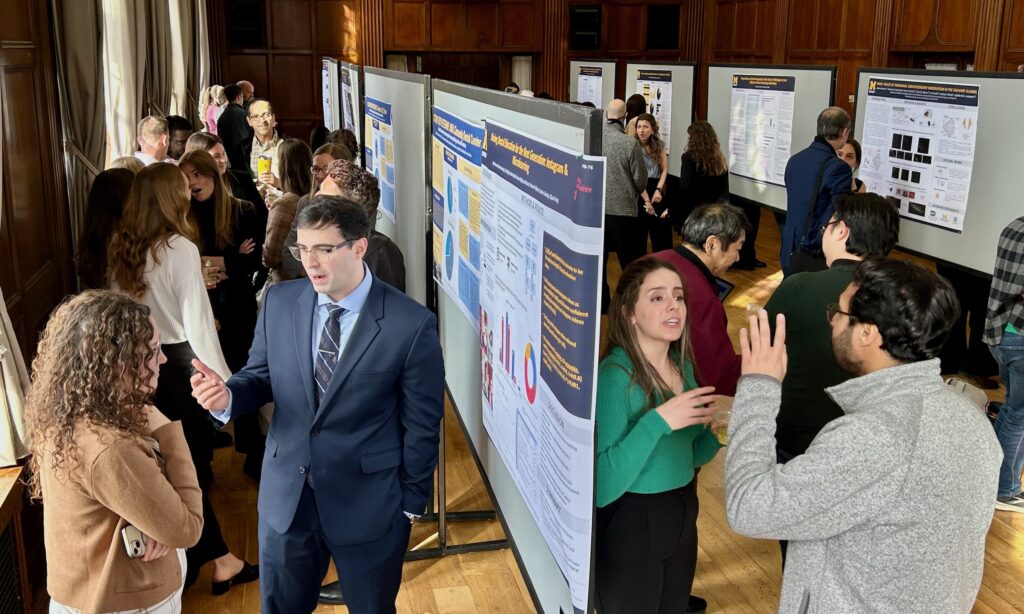
Ann Arbor, Mich., February 18, 2025 – Confusion and concern in the national higher education community over federal funding cuts for scientific research served as a backdrop for the annual Research Day held at the School of Dentistry.
The annual day celebrates the school’s longstanding commitment to scientific research as the essential foundation of its educational mission of training dentists, dental hygienists and researchers. This year, 147 posters detailing a wide variety of research were submitted by the school’s students, postdoctoral trainees, staff and faculty. The presentations provided insight into basic and translational science in areas such as cancer biology, tissue engineering, regenerative medicine and skeletal biology, while also exploring behavioral science related to public health and educational methods.
Between morning and afternoon poster sessions at the Michigan League on Feb. 13, a keynote address and several awards were presented at Kellogg Auditorium at the dental school. In his welcoming remarks, Dr. Vesa Kaartinen, the Dr. Roy H. Roberts Professor of Dentistry and Associate Dean for Research, said Research Day is a celebration of the impressive work being done in the dental school labs that is shaping the future of oral health and healthcare in general.
“We gather here at a time when science is being questioned in ways we haven’t seen in generations,” Kaartinen said. “But let me be clear: Science saves lives. Research finds ways to treat deadly diseases. Research improves the quality of life. These are not opinions; these are facts, demonstrated every day in our labs, clinics and communities.”
“At the University of Michigan School of Dentistry, we are not just discovering knowledge – we are applying it to make a difference. From advancing regenerative medicine to pioneering new treatments for craniofacial disorders or malignant diseases, our researchers are driving innovation that changes lives. Today, you will hear from brilliant minds tackling some of the most pressing challenges in dental, medical and biological sciences. I encourage you to engage, ask questions, and be inspired – because the future of oral and craniofacial healthcare depends on all of us.”
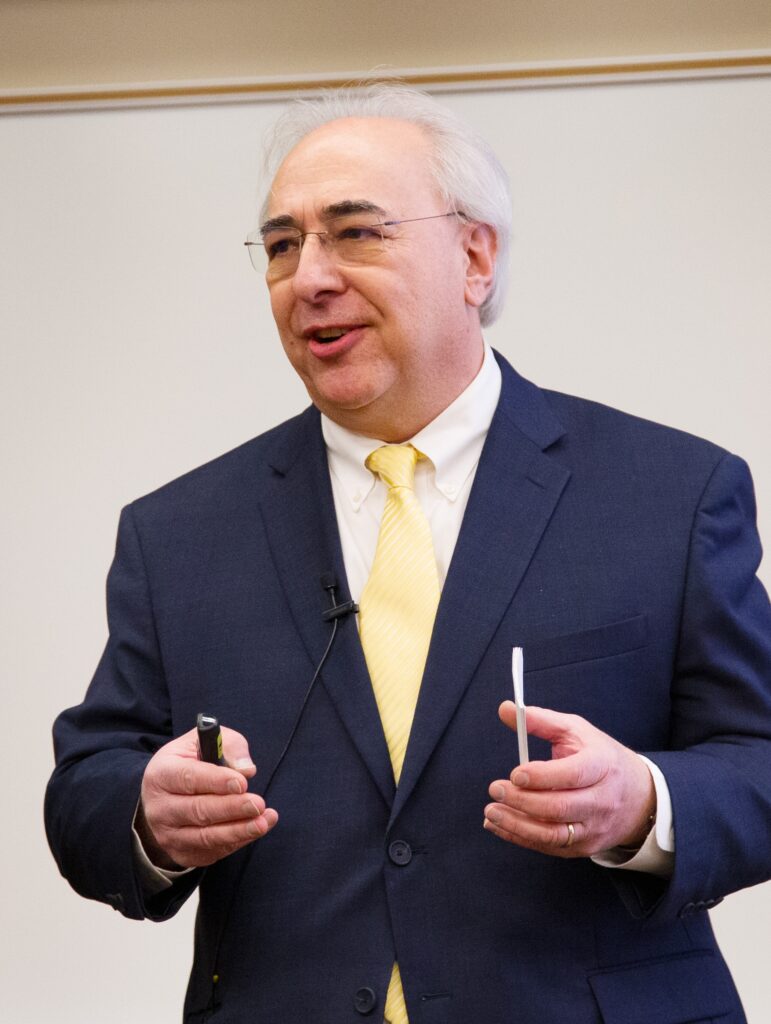
The keynote address was delivered at the School of Dentistry by Dr. Russell Taichman, Professor and Chair of the Department of Basic and Clinical Translational Science at Tufts University School of Dental Medicine in Boston, Massachusetts. He also serves as the Associate Dean for Research for the dental school. Taichman was previously a faculty member at the U-M School of Dentistry and served as Associate Dean for Research. He spoke on “The Power of Questions: Turning Challenges into Breakthroughs in the Quest for Discovery.”
Taichman recounted highlights of his career as a way to illustrate the excitement and promise of scientific research. His work focuses on identifying osteoblast-specific factors that support hematopoiesis. Over time he expanded his focus to understanding the mechanisms used by tumor cells to metastasize to bone marrow. Currently, the Taichman lab explores the identity and function of mesenchymal stem cells in regulating tumor dormancy.
Before outlining the complex science in a few of his many experiments and research papers, Taichman said the foundation of scientific research is much simpler: It is about asking questions, realizing that they haven’t been answered, and getting excited about pursuing the answers. Once a question is raised by science – or even by just a basic observation – scientists want to know, with enthusiasm, “Why is THAT?!?!” Taichman said.
He cited several examples of basic questions about nature and life that he has encountered during his career that prompted him to learn more and realize the interconnections of many aspect of nature and science. For example: We know the science of how deciduous trees use their leaves to “breathe” in the summer, but what happens in the winter when the leaves have fallen? Can animals count? Why do animals lick their wounds? The scientific research behind questions like those is fascinating and instructive for researchers in many other pursuits.
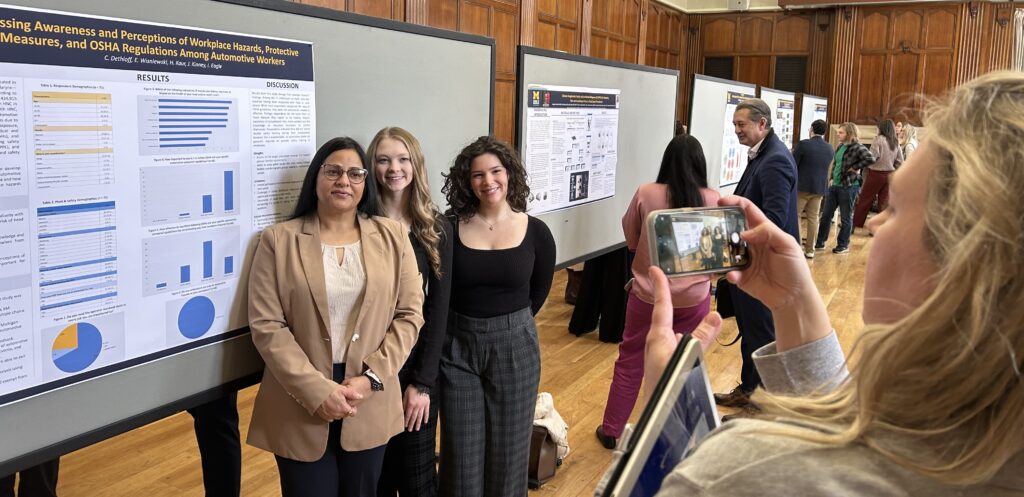
“When I set out to do my science, I wanted to find questions like these, that immediately start your mind racing,” Taichman said. He cited an expression attributed to President Jimmy Carter and others: “Go out on a limb because that’s where the fruit is.”
“As you start your scientific careers,” he said, addressing the early-career trainees in the audience, “it’s important to take on projects that you are passionate about but will have a high-yield of fruit long-term. I would also say, go ask big questions. Go ask big questions that are based in nature. Nature isn’t wasteful. Whether it is animal counting or licking their wounds, or whether trees breathe in winter. These are just metaphors for asking good biologic questions that start the mind racing as soon as you read it.”
Taichman acknowledged that the current uncertainty over major cuts in federal research funding makes it a turbulent time in the scientific community, but he urged colleagues and trainees to remain positive.
“We need to keep at what we do,” he said. “And make sure that we promote the truth in all the things that we do. And the best way to examine the truth is by looking at it rigorously and examining it in an unbiased fashion. That’s what science is all about – trying to understand what our world is all about so we can treat human disease.”
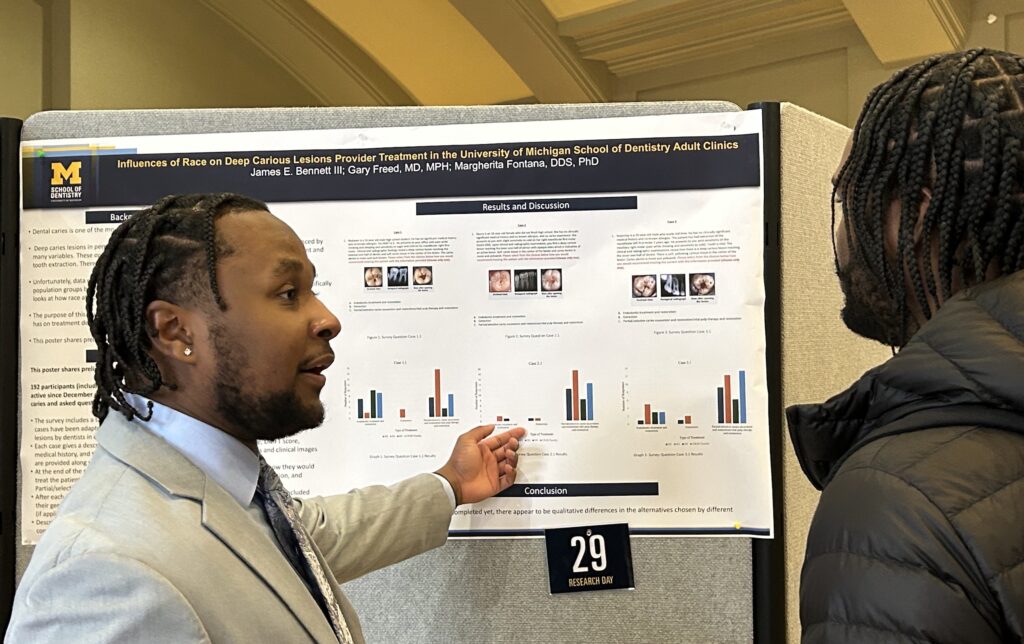
2025 Research Day Awards
Faculty judges visited each researcher during the poster sessions and rated the quality of research, poster presentation and researchers’ oral summary of their work. Top winners are highlighted below, along with three other annual awards presented by the Research Office. Complete results are posted on the Research Day website here.
SCADA (Student Competition for Advancing Dental Research and its Application)
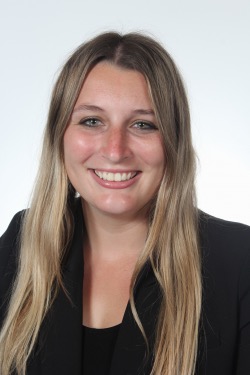
• Kelsey Gruber, a third-year dental student, received the SCADA Award for her research, “Inhibition of Alkaline Phosphatase Alters Orthodontic Tooth Movement.” Faculty mentor: Nan Hatch. The SCADA award is sponsored by the American Association for Dental, Oral, and Craniofacial Research (AADOCR) and Dentsply Sirona, a dental supply company. Each dental school in the United States and Puerto Rico is invited to select one student to compete in this research program. Gruber will represent the school and present her research at the annual meeting and exhibition of the AADOCR in San Diego, California, in March 2026. The Dentsply Sirona Student Research Program was launched in 1959 as a joint venture between Dentsply International and the American Dental Association. The program has grown and evolved into a global research program, including 10 national programs worldwide across 21 countries. In 2016, Dentsply International merged with Sirona Dental Systems to become Dentsply Sirona.
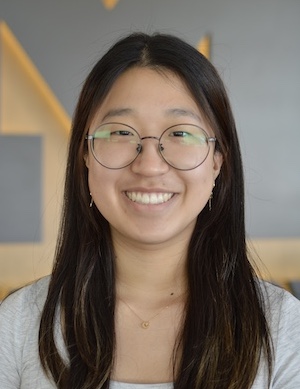
AADOCR Travel Award
• Sarah Seohyun Chang, an undergraduate student in the lab of faculty member Marco Bottino, received the AADOCR Travel Award for attending the 2025 IADR/AADOCR annual meeting and exhibition in New York City in March, where she will present her research: “Modulation of Antimicrobial and Anti-Inflammatory Response Through Core-Shell Fibers Loaded with Metronidazole and Dexamethasone for Periodontal Therapy.” Faculty mentor: Marco Bottino.
Category 1: Clinical Research, Public Health, Behavioral and Educational Research
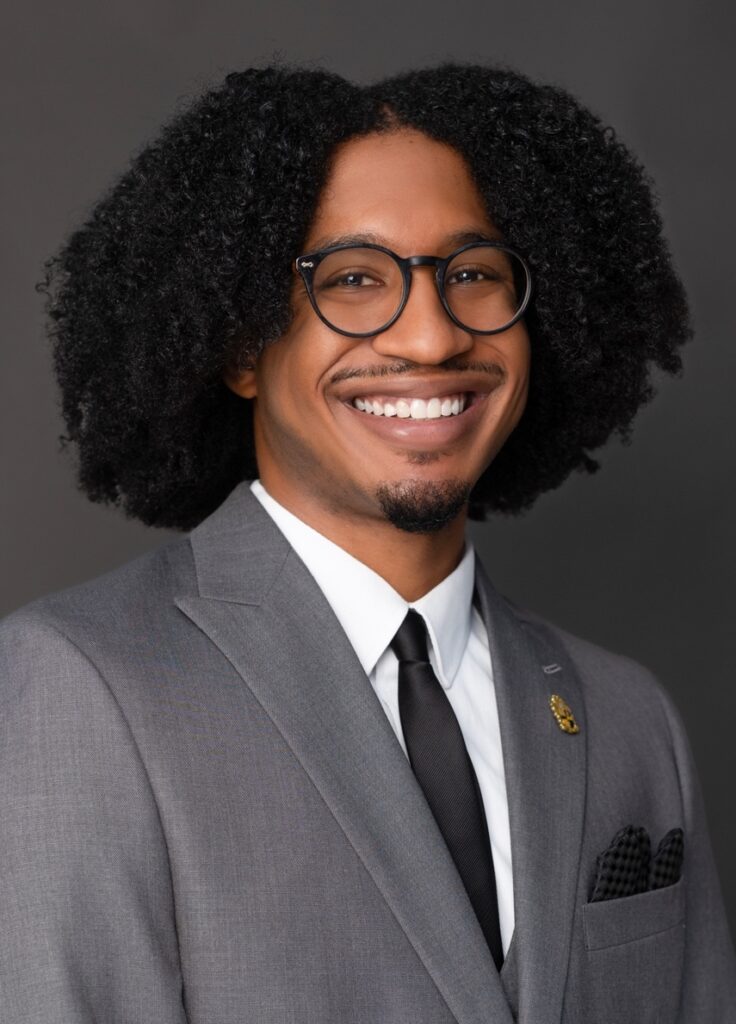
• 1st Place among DDS, Hygiene, Masters and Undergrad students – RayJ Jackson, a fourth-year dental student. Research Title: “Members of the LGBTQ+ Community and Oral Healthcare Utilization.” Faculty mentor: Marita Inglehart.
• 1st Place among PhD Students (DDS/PhD), Postdoctoral Trainees and Staff – Bruno Ribeiro Braga, a visiting scholar in the Department of Orthodontics and Pediatric Dentistry. Research Title: “Alveolar Bone Grafting with Mandibular Symphysis Bone: A Preliminary 3D Study.” Faculty mentor: Lucia Cevidanes.

Category 2: Basic Science Research and Translational Science
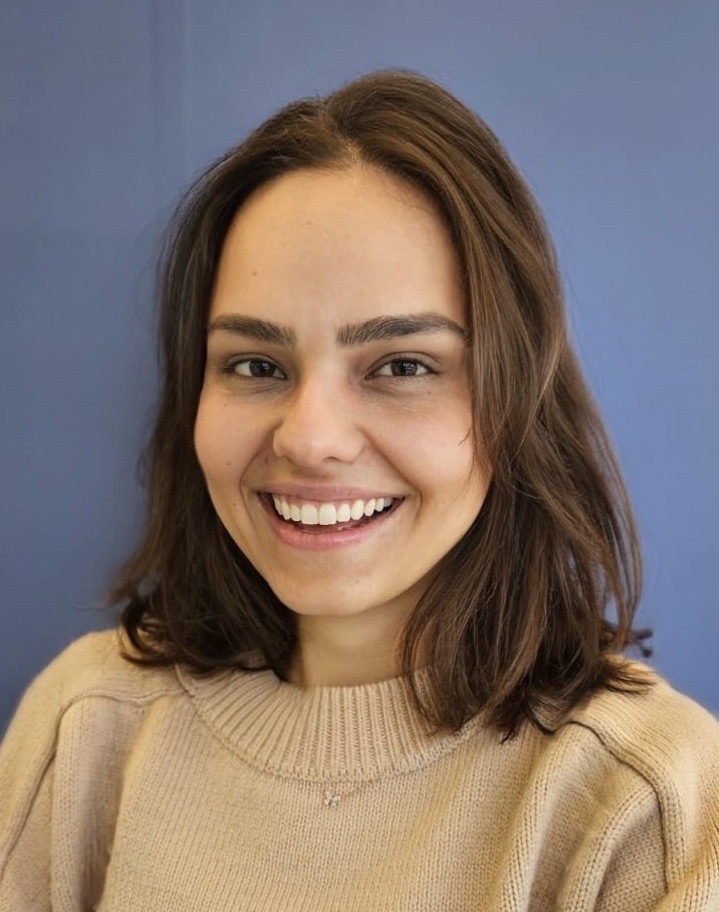
• 1st Place among DDS, Hygiene, Masters and Undergrad students – Kelsey Gruber, a third-year dental student. Research Title: “Inhibition of Alkaline Phosphatase Alters Orthodontic Tooth Movement.” Faculty mentor: Nan Hatch.
• 1st Place among PhD Students (DDS/PhD) and Postdoctoral Trainees and Staff – Juliana Amorim dos Santos, a postdoctoral trainee in the Department of Biologic and Materials Sciences & Endodontics. Research Title: “Novel Traces of Trigeminal Somatosensory Innervation in the Salivary Glands.” Faculty mentor: Isabelle Lombaert.
Dental Hygiene
• 1st Place Original Research Award – Vy Tran, Niebal Sukar and Manaal Zubair, fourth-year Dental Hygiene students. Research Title: “The Role of Prediabetes Risk Surveys and Chairside Glucose Testing in Michigan Dental Practices.” Faculty mentor: Iwonka Eagle.
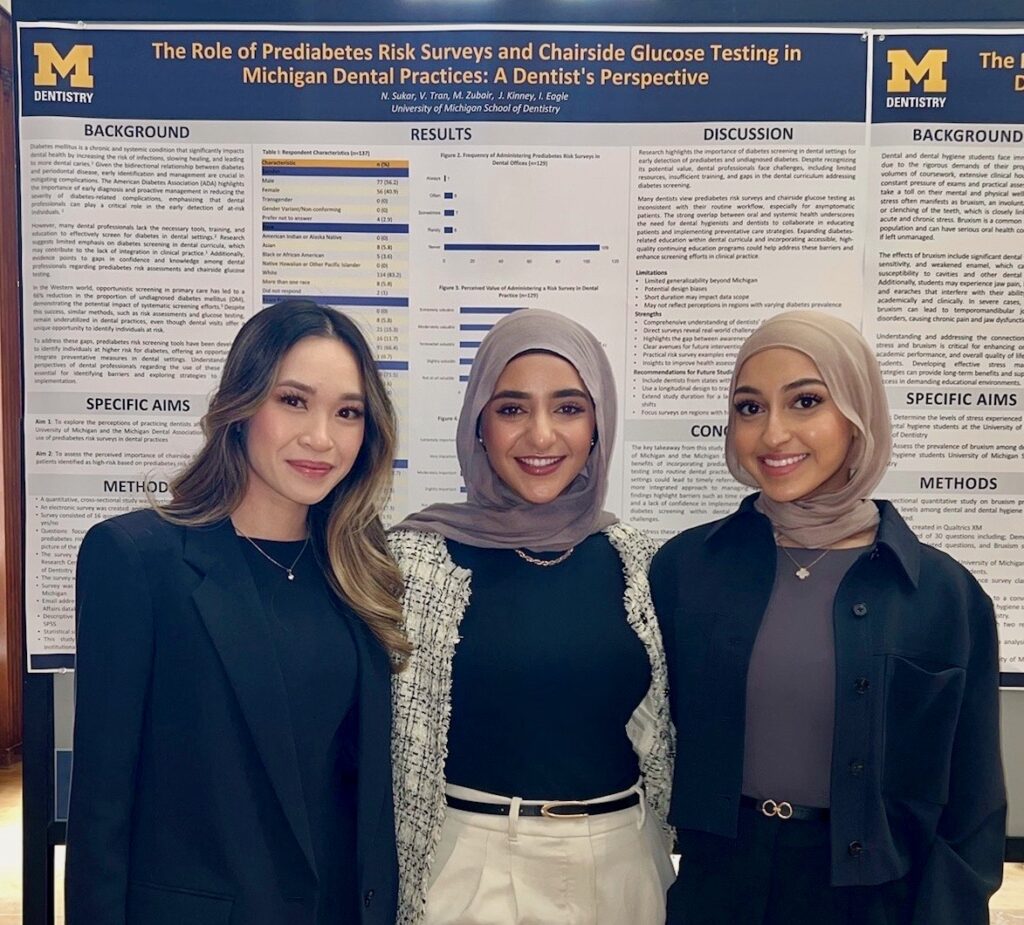
Other Research Day Awards
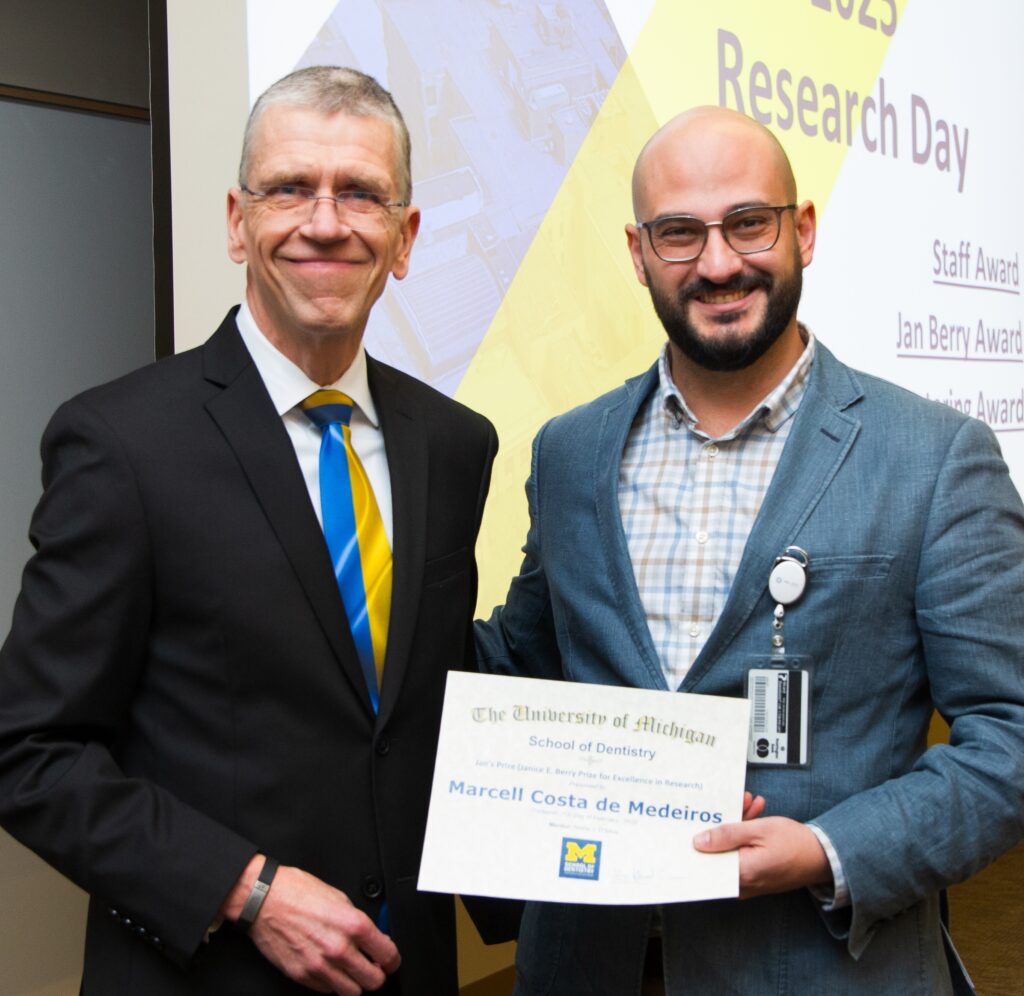
• The Janice E. Berry Prize for Excellence in Research was presented to Dr. Marcell Costa de Medeiros, a Research Investigator in the lab of faculty member Dr. Nisha D’Silva in the Department of Periodontics and Oral Medicine.Costa de Medeiros was cited for his dedicated and passionate research into oral cancer, during which he demonstrates diligence to rigorous and complex research procedures. “Marcell is a careful scientist, designing and meticulously executing experimental studies in oral cancer,” a nominator wrote. “Importantly, he is very collaborative with other post-doctoral fellows, graduate students, and laboratory staff.” Since joining the D’Silva lab, he has published six papers, two as first author, in journals with significant impact factors. He was also cited as an excellent teacher, collegial mentor and engaged lab team member. The family of Berry, a longtime U-M and dental school staff member who died in 2016, created the $1,000 award, also known as Jan’s Prize, to recognize a full-time researcher who may be currently experiencing a financial hardship. Berry was well-known for her steady and compassionate encouragement and support of researchers at the school, including an understanding that research sometimes creates financial hardships. The recipient of Jan’s Prize must have demonstrated excellence in research, teaching, mentoring, service and leadership.
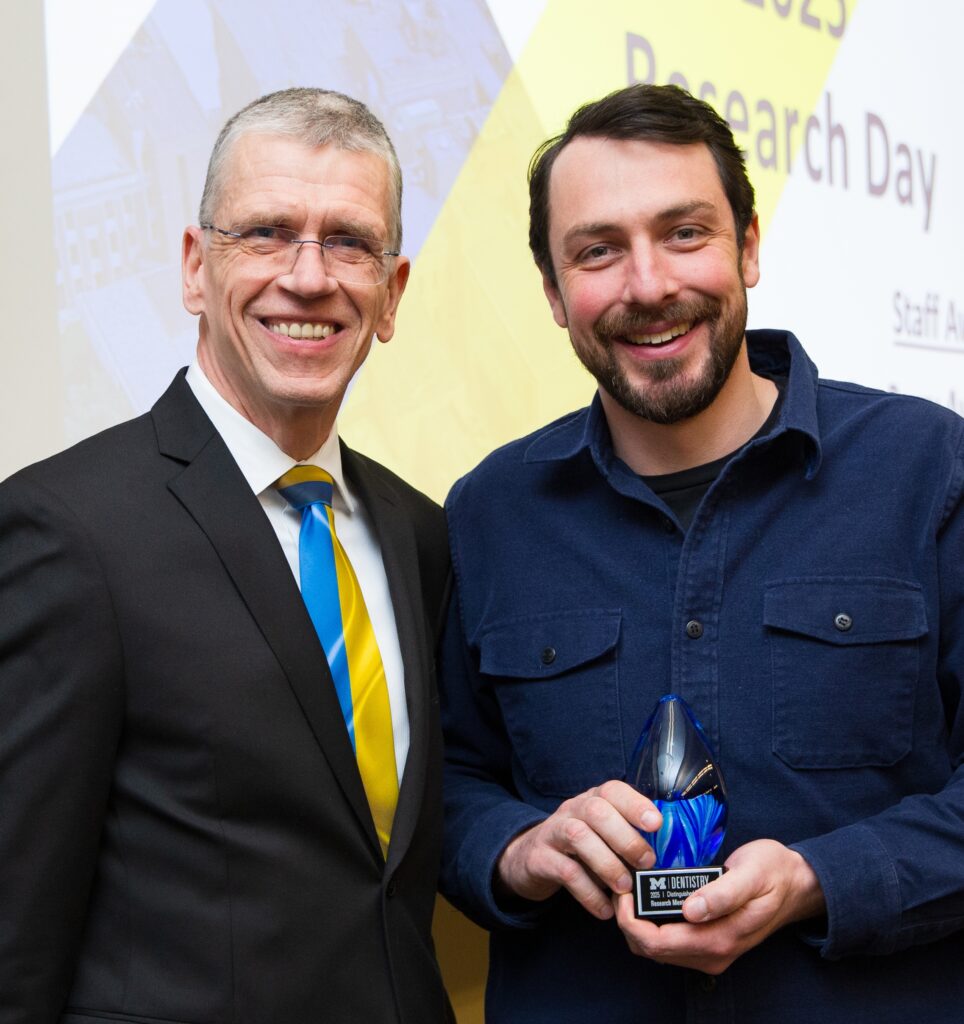
• Dr. Joshua Emrick, Assistant Professor of Dentistry in the Department of Biologic and Materials Sciences and Prosthodontics, received the Distinguished Faculty Mentoring Award. It recognizes faculty who consistently impart their research knowledge and experience with students and scholars in areas of clinical, basic science and-or translational research. Emrick was described as “an incredibly caring and dedicated mentor, committed to supporting trainees not only within his research laboratory but also across the Dental School and surrounding research communities at U-M.” Nominators cited his accessibility for members of his lab that creates a culture of mutual support and collaboration. “This respect encourages us to share our ideas freely and contributes significantly to our growth as independent researchers,” nominators said.
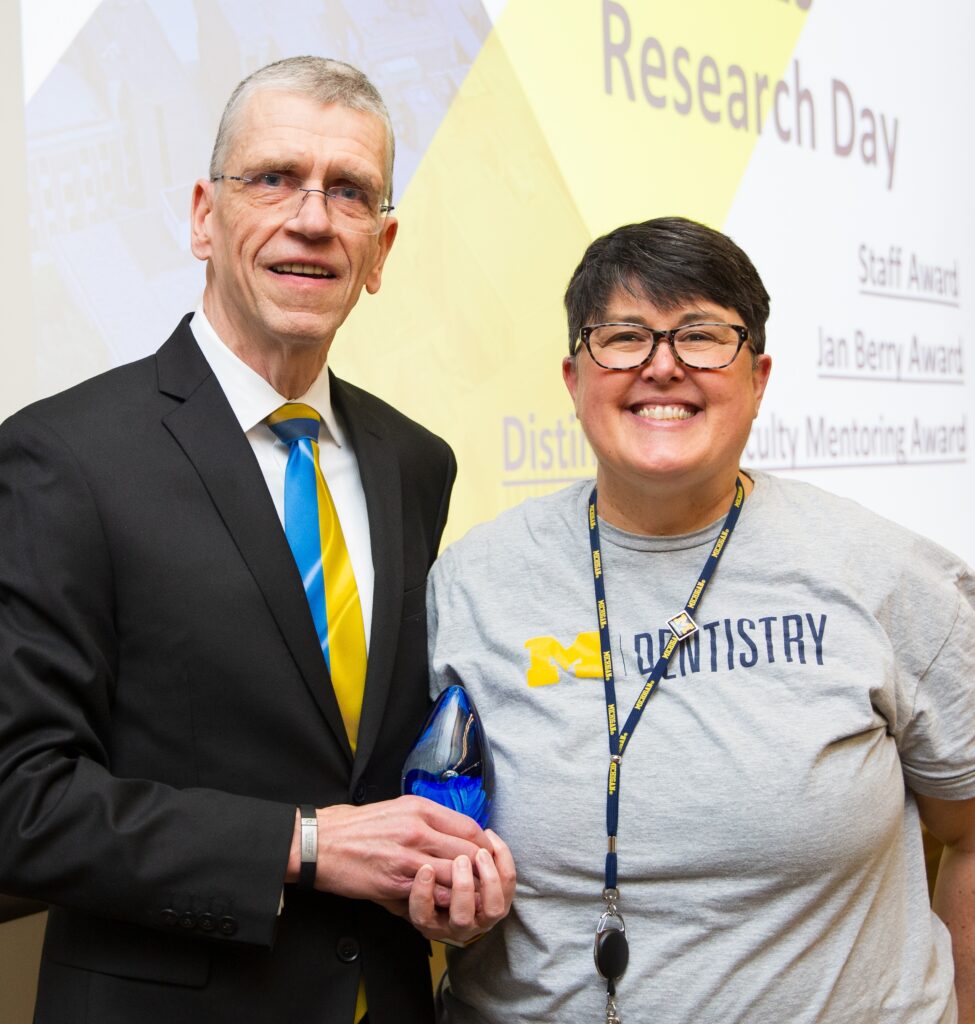
• Jennifer Linzmeier, Research Administrator in the Office of Research, received the Research Staff Recognition Award. A nominator said Linzmeier “has consistently exemplified the qualities of a dedicated, knowledgeable, and supportive leader.” Her hands-on approach to training, project management and problem-solving on the Contracts and Grants Team was cited as “invaluable in overcoming challenges, ensuring compliance, and facilitating the success of numerous research projects.” Additionally: “Her leadership has not only enhanced the productivity and morale of her team but has also contributed to the overall success of the School of Dentistry’s research goals.”
A complete list of the 2025 Research Day Awards is posted on the Research Day webpage. It also lists the dentistry- and research-related companies who attend the event as exhibitors and-or provided sponsorship and advertising to support it.
Research Day is organized by the school’s Office of Research, under the direction of Dr. Vesa Kaartinen, Associate Dean for Research.
On June 12-13, the School of Dentistry will host a research symposium, “150 Years of Research Innovation in the Oral Health Sciences,” as one of the special events scheduled in 2025 to celebrate the school’s sesquicentennial. The two-day agenda of speakers will cover the school’s history of leading research and will conduct a visionary look ahead to what oral and craniofacial research holds in the next 150 years. More information is available on the symposium website.
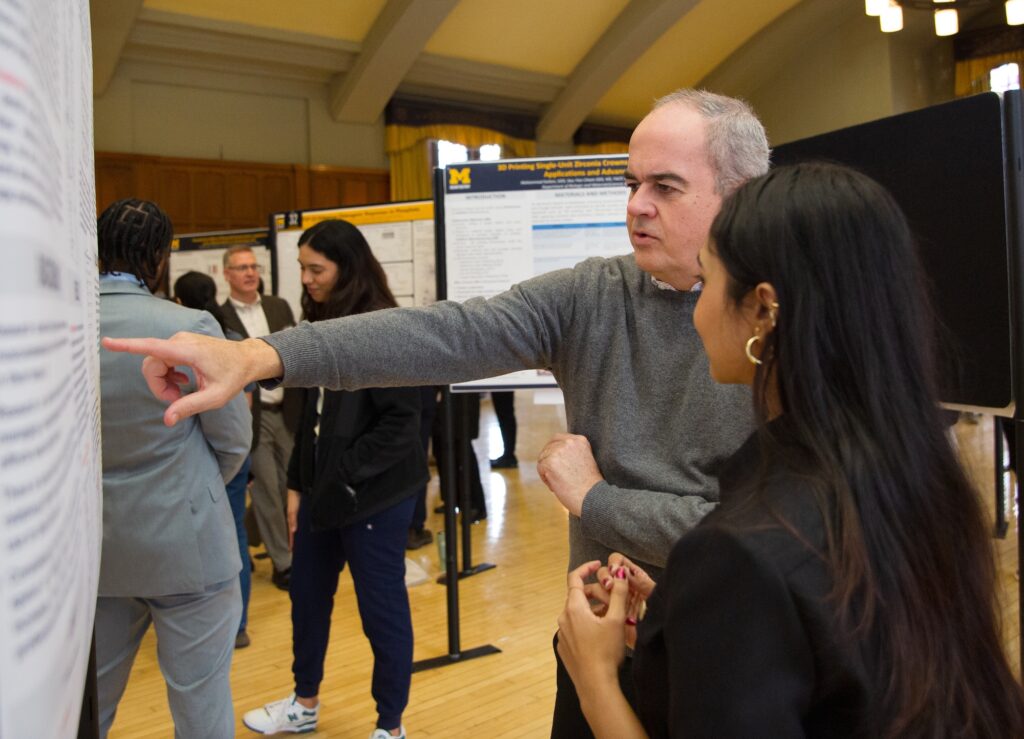
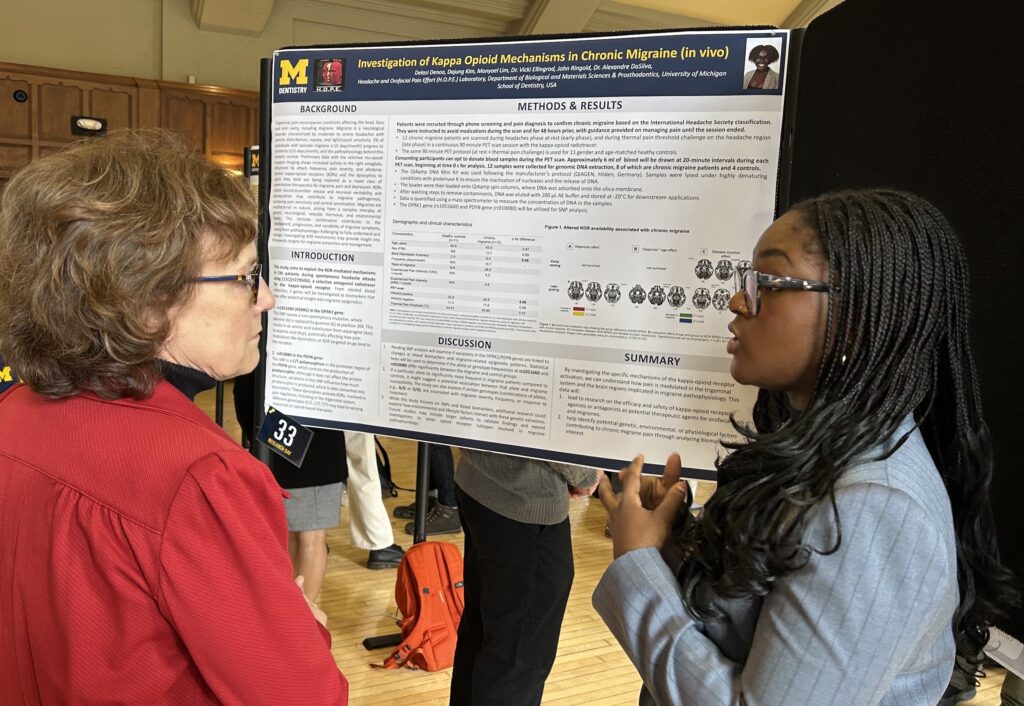
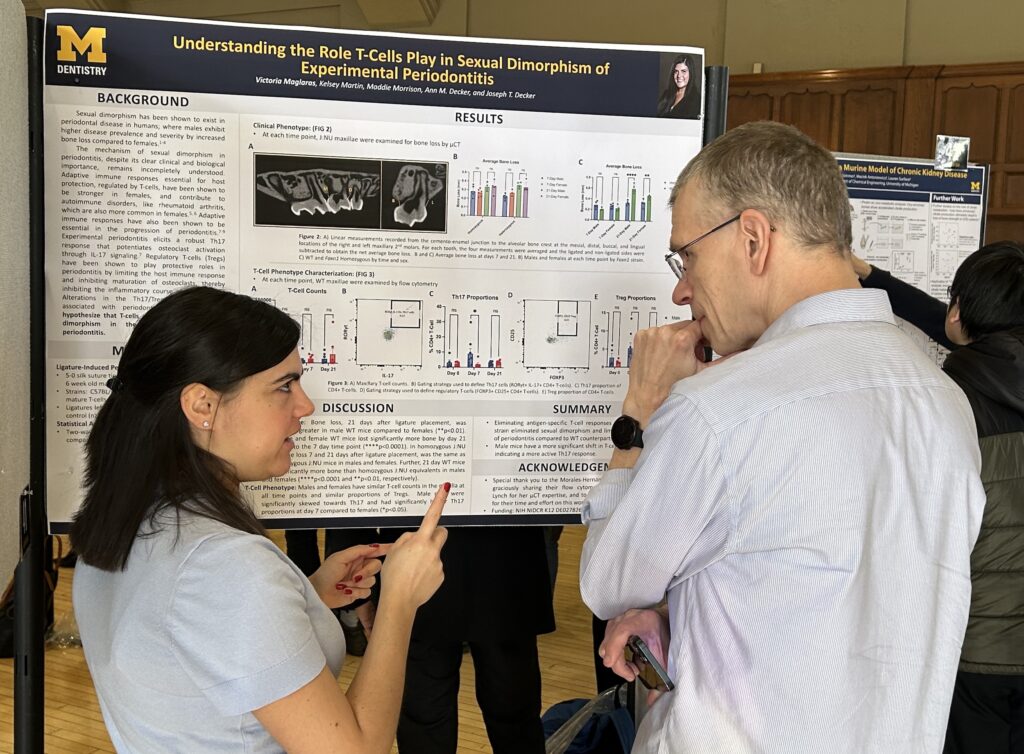
###
The University of Michigan School of Dentistry is one of the nation’s leading dental schools engaged in oral healthcare education, research, patient care and community service. General dental care clinics and specialty clinics providing advanced treatment enable the school to offer dental services and programs to patients throughout Michigan. Classroom and clinic instruction prepare future dentists, dental specialists and dental hygienists for practice in private offices, hospitals, academia and public agencies. Research seeks to discover and apply new knowledge that can help patients worldwide. For more information about the School of Dentistry, visit us on the Web at: www.dent.umich.edu. Email: [email protected], or (734) 615-1971.
